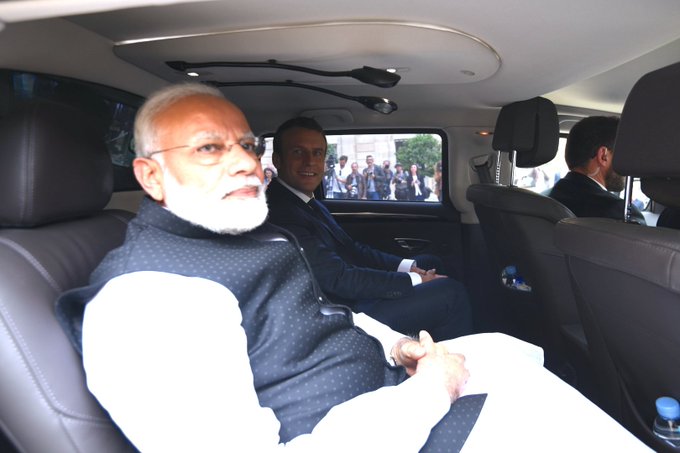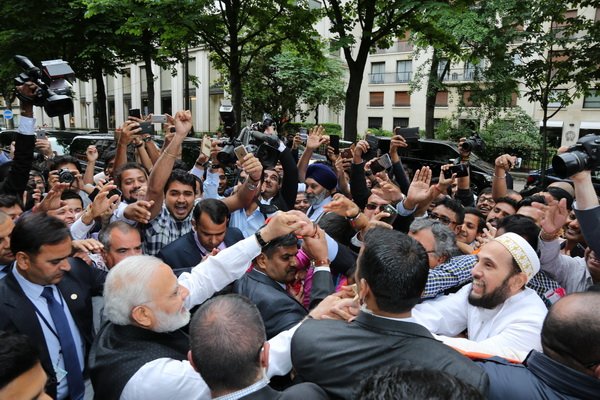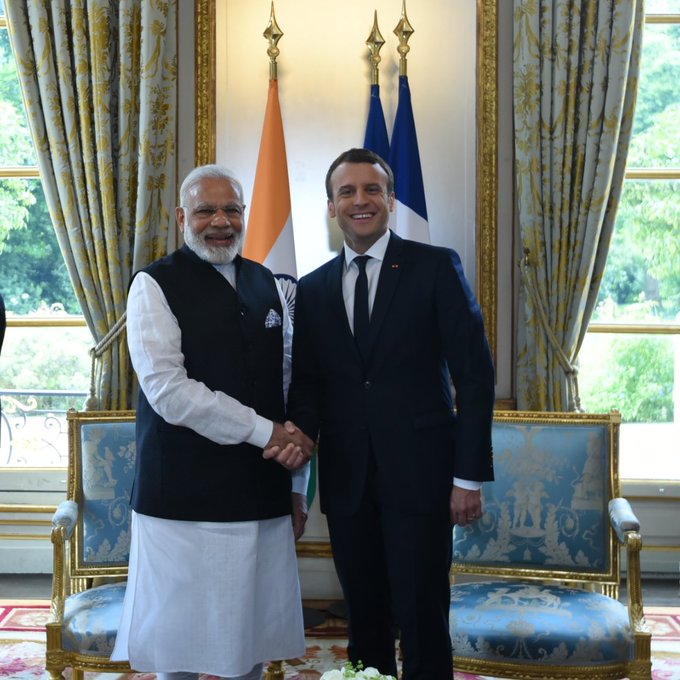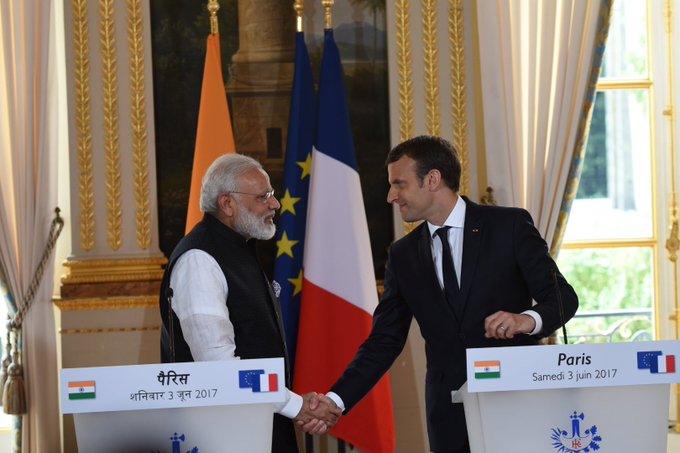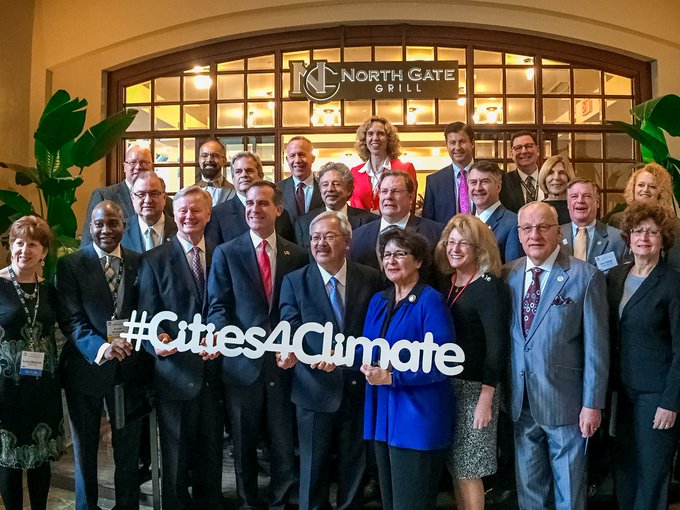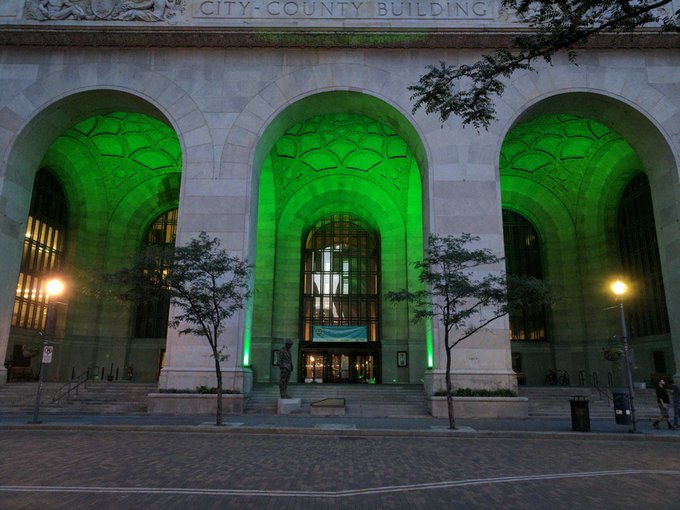M WAQAR..... "A man's ethical behavior should be based effectually on sympathy, education, and social ties; no religious basis is necessary.Man would indeed be in a poor way if he had to be restrained by fear of punishment and hope of reward after death." --Albert Einstein !!! NEWS,ARTICLES,EDITORIALS,MUSIC... Ze chi pe mayeen yum da agha pukhtunistan de.....(Liberal,Progressive,Secular World.)''Secularism is not against religion; it is the message of humanity.'' تل ده وی پثتونستآن
Saturday, June 3, 2017
Despite Trump climate turmoil, India's PM Modi reaffirms Paris pact during France visit
Indian Prime Minister Narendra Modi vowed after meeting French President Emmanuel Macron Saturday to go "above and beyond" the Paris Agreement on climate change, after the US said it would quit the deal.
Speaking two days after US President Donald Trump announced plans to withdraw from the deal on curbing carbon emissions, Modi said it was "part of the world's shared heritage" and that India would "continue working...above and beyond the Paris accord".
The agreement signed by 195 countries in the French capital in 2015 "can protect future generations and give new hope," the Indian leader said.
He avoiding direct criticism of Trump's move, however.
My gratitude to the Government and people of France for their hospitality during my visit. This was a significant visit.
Macron said that during two hours of the talks that encompassed trade, defense and the anti-terror fight the pair had "mainly discussed our commitment to the climate".
"I want to restate here France's full commitment to the fight against climate warming," said the president, who reacted to Trump's announcement Thursday with a memorable call to "make the planet great again" -- a play on Trump's pledge to "make America great again" that has been shared by tens of thousands of Twitter users.
Macron said he would visit India, the world's third-largest carbon emitter, by the end of the year for an international summit on solar power -- an area on which France plans closer cooperation with the Asian power.
The Frenchman has led Europe's defence of the Paris accord in the face of Trump's climate scepticism.
As justification for his move Trump accused China and India of benefitting from the deal at the expense of the US.
Modi said protecting "mother Earth" was part of Indian culture, enshrined in the country's holy texts.
Arriving at the presidential palace the 66-year-old prime minister hugged 39-year-old Macron, in scenes contrasting with Macron's white-knuckle handshake with US President Donald Trump last week.
On Friday, the Indian government said it was committed to the Paris climate accord irrespective of the position of other nations.
"As far as the Paris accord is concerned... our government is committed irrespective of the stand of anyone, anywhere in the world," Environment Minister Harsh Vardhan told reporters.
US does not need Trump to fulfil Paris Accord, says ex-NY mayor Bloomberg to Macron
Subscribe to our videos for free!
Text by NEWS WIRES
Latest update : 2017-06-03
U.S. cities, states and businesses can fulfil commitments made by the United States under the Paris climate change agreement even though the U.S. has withdrawn from the pact, former New York mayor Michael Bloomberg said in Paris.
"Americans don't need Washington to meet our Paris commitments, and Americans are not going to let Washington stand in the way of fulfilling it," Bloomberg said following a meeting with French President Emmanuel Macron and Paris Mayor Anne Hidalgo on Friday.
Bloomberg, who is the U.N. Secretary-General's special envoy for Cities and Climate Change, said the United States has led the world on emission reductions over the past decade. Those efforts had been led by citizens and cities, he added, not the federal government, aided by market forces that have made solar and wind energy cheaper than coal.
"I want the world to know that the U.S. will meet its Paris commitments and that through partnerships among cities, states and businesses we will seek to remain part of the Paris agreement process," Bloomberg said.
He said he would notify the U.N. Secretary General and the climate change secretariat that U.S. cities, states, businesses and others will aim to meet the United States' commitment to reducing emissions 26 percent below the 2005 levels by 2025.
Trump maybe withdrawing the US, but 61 #ClimateMayors are adopting the #ParisAgreement. Cities will lead the way http://bit.ly/2qG3yxG
"We are already halfway there and we can accelerate our process further even without any support from Washington," Bloomberg said.
He said his own foundation will help coordinate the U.S. effort, which will be called America's Pledge, and it will help submit "nationally determined contributions" like other nations.
The foundation will provide the $15 million commitment the U.N. climate change secretariat will lose from Washington to ensure there is no disruption in their work, he said. It will also help fulfil the Paris agreement reporting requirements so that the world can track the United States' progress.
Tonight Pittsburgh's City County Building joins 174 US cities & the rest of the world supporting the Paris Agreement
Macron, in a joint news conference with Bloomberg and Hidalgo, said the Paris climate pact is irreversible despite U.S. President Donald Trump's decision to withdraw from it.
"The Paris agreement is irreversible and will be implemented because it is our responsibility," he said.
He added that China, Russia and India had confirmed their commitment to it.
"Yesterday, the government of a great nation renounced its climate obligations, but a nation is not only its government," Macron said. "Other actors -- political and economical and civil -- have stood up, and thousands of promising initiatives are being taken. We will support them and fight on their side."
"افغان طالبان یوازې په کوټه کې د چندې ۱۵ مرکزونه لري"
ټولنیزو رسنیو کې یو داسې لیک خپور شوی دی چې پکې د بلوچستان له خلکو غوښتنه شوې ده چې له افغان طالبانو سره مالي مرستې وکړي. دا لیک د بلوچستان پښتون مېشتې سیمې ږوب د مرکزي جامع مسجد خطیب خپور کړی. هغه وايي دوی دا کار له تېرو څو کلونو راهسې کوي. خو د بلوچستان د کورنیو چارو وزارت وايي ، په دې اړه به پلټې کوي او چنده کوونکو ته به سزا ورکوي.
د ږوب ښار د مرکزي جومات د خطیب مولوي الله داد له نامه په خپاره شوي دې لیک کې ویل شوي چې افغان طالبان له مالي مشکلاتو سره مخامخ دي او خلک د دې هغوی لپاره پیسې ورکړي.

لیک زیاتوي چې هر چنده ورکوونکی کس دې رسید له مولوي الله داد څخه تر لاسه کړي. پر دې لیک د نوموړي د ټېلیفون نمبر هم ورکړل شوی دی.
مولوي الله داد پر هم دې ټلیفون نمبر نه یوازې د دې لیک خپرولو پخلی وکړ بلکې وايي چې د بلوچستان په ډېرو سیمو کې د افغان طالبانو لپاره چندې ټولېږي.
مولوي الله داد د جمعې په ورځ مشال راډیو ته وویل چې دوی دا چندې د افغان طالبانو د مالي کمېسون په غوښتنه ټولوي.
نوموړي د دې کمېسون په اړه وویل، "دا مرکزي مالي کمېسیون دی. مخکې مشر مولوي محمد اکرم وو چې په یوه پښه ګوډ هم وی. اوس نو مولوي محمد اکرم سږ کال وفات شو. مولوي عبدالصمد په جېل کې دی. اوس بیا مولوي عبدالمنان دی د لورلايي د کټوۍ د کېمپ او د هغه ملګري دي. دا د امارت اسلامي مرکزي مالي کمېسون دی. هغوی په ښکاره چندې کوي. په خضدار کې کېږي. په کوټه کې یې پنځلس مرکزونه دي او هلته دوی دا کار کوي."
مولوي الله داد وویل، د افغان طالبانو دا چنده ټولوونکي مشران هر کال په ځانګړې توګه د بلوچستان په پښتني سیمو کې ګرځي او د چندو غوښتنه کوي. "هغوی همېشه راځي. د روزې په میاشت کې دا مطالبه وکړي. دا څلور پنځه کاله وشو. د [پروېز مشرف] په وخت کې دا اواز یو څه کښته شوی وو خو چې هغه ولاړ نو له هغه وروسته دوی ځي او نه ده چې یوازې ږوب ته راځي بلکې لورالايي له ځي ، کلاسېف الله له ځي ، مسلم باغ له ځي او په کوټه کې چې ما درته وویل دا ملایان دي. دا کمېسیون دی. په ښکاره ځي دورې کوي او چندې ټولوي."
له مولوي الله داد څخه مې وپوښتل چې تاسو څومره پېسې ټولوی او بیا یې تر افغان طالبانو څنګه رسوئ نو هغه وویل، "دا بیا زه دوی ته ورکوم. دوی بیا راسي د ختم پر موقع (یانې د روژې په پای کې)، کله یې بیا موږ په یو چا ور ولېږ. له درې نیم لاکو تر دوو لکو او کله څومره وي او کله څومره.''
د بلوچستان د کورنیو چارو وزیر سرفراز بګټي مشال راډیو ته وویل چې دوی په دې اړه تر اوسه هیڅ رپوټ نه دی ترلاسه کړي.
هغه وویل ، اوس چې د مشال راډیو له لارې خبر شو نو به یې پلټنې وکړي. "موږ ته تر اوسه چا داسې خبر نه دی راکړی. که داسې وي نو دا بیا یو ډېره جدي مسله ده. زه ستاسو له لارې په خبر شوم. او موږ به هیڅ یوه چا ته د دې اجازه ورنکړو چې د ترهګرو سازمانونو لپاره چندې وکړي. موږ د دې پلټنې کوو او چې هر څوک پکې لاس ولري نو کلکه سزا به ورکوو."
د سیاسي او امنیتي چارو کارپوه ډاکټر خادم حسېن وايي، دا لړۍ له کلونو نه بلکې لسیزو راهسې روانه ده چې د پاکستان خاوره په یوه او بله بڼه د افغانستان او ګاونډیو پرضد استعمالېږي.
نوموړی وايي، د ترهګرۍ مخینوي او سختدریځۍ له منځه وړلو لپاره په جوړ شوي نېشنل ایکشن پلان کې شامل وو چې د داسې کړنو به مخه نیول کېږي.
خو د ډاکټر خادم حېسن په وینا ، په پاکستان کې د ترهګرۍ ضد مفکوره یا خو نشته او یا هم د نه برابره ده.
دا په داسې حال کې ده چې د افغانستان حکومت وايي ، پاکستان نه یوازې پر خپله خاوره افغان طالبانو ته پټنځایونه ورکړي دي بلکې مرستې او ملاتړ یې کوي خو پاکستان دا خبره تل ناسمه او بې اساسه بللې ده.
https://www.mashaalradio.com/a/28525053.html
The West is indifferent to Afghanistan and Iraq’s world of terror
By Ishaan Tharoor
It's a truism that the world has grown numb to terrorist attacks outside the West. When the Islamic State set off a car bomb on Tuesday outside a popular ice cream shop in Baghdad, killing 13 people and wounding dozens more, no candlelight vigils took place in Western cities. No imperial monuments were lit up in Iraqi colors in European capitals. When militants set off a devastating explosion in Kabul's diplomatic enclave on Wednesday, killing at least 80 people and injuring hundreds more, no CNN anchor uploaded the flag of Afghanistan on social media. No pop stars organized solidarity concerts.
Part of the contrast, of course, is the extent to which we are used to hearing these stories. In the global news cycle, a bombing in Baghdad or a Taliban strike in Kabul is like a typhoon in the Pacific or a Sean Spicer gaffe. These things happen. If we pay attention at all, we do so fleetingly, grimace at the calamity and move on.
The difference lies in distance. The capitals of Iraq and Afghanistan are zones of war, their roads made familiar to us only through years of U.S. military deployments. In the American consciousness, this is where the killing is supposed to happen. But easy as it is gloss over death, it's important to recognize life.
On Tuesday in Iraq, “hours after the blast, builders were working at the al-Faqma ice-cream parlor, plastering over cracks and repainting walls,” noted an editorial in Britain's Guardian newspaper. “By evening the streets and restaurants were full again with families, demonstrating the resilience that was feted in Manchester and is taken for granted in the places that must summon it time and time again.”
In shell-shocked Kabul, scene of one of the worst attacks in many years, residents lurched into a new reality. My colleague Pamela Constable reported on Thursday from the perimeter of the massive blast site as protesters vented their rage and grief at a government that couldn't keep them safe.
“Let us turn the silence of suffering into a national voice. We must all come together to stop terrorism from going any further and raise our voices against oppression,” a young man with a bullhorn exhorted the crowd.
In the United States, a great deal of attention has been paid to the effect of more than a decade of war on the mental health of American servicemen and women — and rightly so. But in Iraq and Afghanistan, whole societies have been traumatized. Millions of children grow up amid bombings, displacement and political collapse. Public health workers and aid agencies are still trying to measure the immense psychological toll they may have suffered.
So it's worth considering the depth of courage ordinary Afghans and Iraqis must show in the face of daily threats and violence.
“There had been many other bombings, some even deadlier. But this time, it felt like the collective burden of a society at war had suddenly become much heavier,” Constable wrote after the attack Wednesday. It's a weight that can't be easy to carry.

Civil society activists light candles on June 1, 2017, at a memorial for the victims of a bomb attack a day earlier in Kabul. (Jawad Jalali/European Pressphoto Agency)
“People have an anxious feeling now, like a psychological illness. I feel suspicious if I see someone carrying something,” said Gul Rahim, 42, a real estate agent whose office lost all its windows in the blast, speaking to The Washington Post. “I was in the jihad [against the Soviet Union], and there were a lot of bombs and rockets. This was much worse.”
“In the face of this senseless and cowardly act, the U.S. commitment to Afghanistan is unwavering,” Secretary of State Rex Tillerson said in a statement. “The United States stands with the government and the people of Afghanistan and will continue to support their efforts to achieve peace, security, and prosperity.” The Pentagon is said to be pushing the White House to authorize a new surge of troops. But peace will require negotiations and a political settlement with the Taliban that Trump has so far shown no interest in championing.
In the meantime, consider the struggles of those already scarred by war. A stunning piece recently published by the Bureau of Investigative Journalism detailed the prevalence of amputees on the front lines of the war against the Taliban.
“If I go and sit in my house Taliban will go to my house and kill me,” said Kudai Rahm Shakir, a police official in Afghanistan's insurgency-ravaged Helmand province who lost both legs to an improvised explosive device a year ago. “This is the only way for me to protect myself and survive.” Another police officer deployed not far from Shakir drives a Humvee with “no problem.” He's missing a leg. “There are people who are in worse condition than I am,” he said. “I still have one leg.”
You can lament their desperation, wonder at the woeful state of Afghanistan's security forces and even celebrate their resilience. But months from now, will the world still note these acts of courage, or remember the many victims in Kabul and Baghdad the way those slain last week in Manchester will be memorialized? Probably not. And it's more than time for that to change.
Afghanistan: From Soviet Occupation to American ‘Liberation’ – OpEd
By Nauman Sadiq
During the election campaign of 2008 before he was elected as the president, Barack Obama made an artificial distinction between the “just war” in Afghanistan and the unjust war in Iraq. In accordance with the flawed distinction, he pledged that he would withdraw American troops stationed in Iraq.
The unilateral intervention in Iraq by the Bush Administration was highly unpopular in the American electorate. Therefore Obama’s election pledge of complete withdrawal of the US troops from Iraq struck a chord with the voters and they gave an overwhelming mandate to the ostensibly “pacifist” contender during his first term as the president.
In keeping with the election pledge, President Obama did manage to successfully withdraw the last American soldier from the Iraqi soil in December 2011 during the first term as the president, but only to commit thousands of American troops and the US Air Force to Iraq just a couple of years later during the second term as the president when the Islamic State overran Mosul and Anbar in early 2014.
The borders between Iraq and Syria are poorly guarded and highly porous. The Obama Administration’s policy of nurturing militants against the Assad regime in Syria for the first three years of the Syrian civil war from 2011 to 2014 was bound to backfire sooner or later.
More to the point, however, when President Obama decided to withdraw American troops from the unjust war in Iraq, at the same time, he pledged that he would commit additional American troops and resources into the purportedly “just war” in Afghanistan. And consequently, the number of US troops in Afghanistan jumped from 30,000 during the Bush Administration to more than 100,000 during the supposedly “pacifist” Obama Administration.
And now, the “steady hands” of the American deep state, the Secretary of Defense James Mattis and the National Security Advisor H.R. McMaster, have advised the Trump Administration to further escalate the conflict in Afghanistan by deploying 3,000 to 5,000 additional troops to a contingent of 8,500 US troops already stationed in Afghanistan as “trainers and advisors.”
If more than 100,000 US troops at their peak during the Obama Administration’s tenure failed to achieve any long-term objective in Afghanistan, then how do Generals Mattis and McMaster expect from 3,000 to 5,000 additional troops to salvage the failed Afghan policy of the successive US administrations?
If the Trump Administration adopted an attitude of appeasement towards the diktats of the deep state, then it will only be a first step before the quagmire in Afghanistan will suck in tens of thousands of additional US troops and resources in the coming years.
Coming back to the topic, no one can dispute the assertion that the notions of “just wars” and “good militants” do exist in the vocabulary; empirically speaking, however, after witnessing the instability, violence and utter chaos and anarchy in the war-ravaged countries like Afghanistan, Iraq, Libya, Syria, South Sudan, Somalia and Yemen, the onus lies on any “liberal interventionist” to prove beyond doubt that the wars and militants that he justifies and upholds are indeed just and good.
More surprisingly, however, if Afghanistan was an occupied country during the years of Soviet occupation from 1979 to 1988 then how did it become a free country after the American occupation of Afghanistan since 2001-onward?
 |
| U.S. state Dept paid millions of dollars to publish such school text for the Afghan kids to prepare jihadis aginst the Soviets. |
Furthermore, if the Afghan so-called “Mujahideen” (freedom fighters) nurtured by the Carter and Reagan Administrations with the help of Pakistan’s intelligence agencies and Saudi money constituted a legitimate resistance against the Soviet occupation of Afghanistan, then by what principle of consistent logic, the resistance against American occupation of Afghanistan can be reviled as “terrorism”?
In international politics, the devil always lies in the definitions of the terms that we employ. And the definition of the term “terrorism” has been deliberately left undefined by the Western powers to use it as a catch-all pretext to justify their military presence and interventionist policy in the energy-rich Islamic countries.
More to the point, there is a not-so-subtle distinction between a terrorist and an insurgent: an Islamic insurgent believes in something and wants to enforce that agenda in the insurgency-hit regions, while a terrorist is just a bloodthirsty lunatic who is hell-bent on causing death and destruction. The distinguishing feature between the two is that an insurgent has well defined objectives and territorial ambitions, whereas a terrorist is basically motivated by the spirit of revenge and the goal of causing widespread fear.
After invading and occupying Afghanistan and Iraq and when the American “nation-building” projects failed in those hapless countries, the US policymakers immediately realized that they were facing large-scale and popularly-rooted insurgencies against foreign occupation; consequently, the occupying military altered its CT (counter-terrorism) approach in the favor of a COIN (counter-insurgency) strategy.
A COIN strategy is essentially different from a CT approach and it also involves dialogue, negotiations and political settlements, alongside the coercive tactics of law enforcement and military and paramilitary operations on a limited scale.
The phenomena which is currently threatening the Islamic countries is not terrorism, as such, but Islamic insurgencies. Excluding al Qaeda Central which is a known transnational terrorist organization, all the regional militant groups like the Taliban in Afghanistan, the Islamic State in Iraq and Syria, al Shabab in Somalia and Boko Haram in Nigeria, and even some of the ideological affiliates of al Qaeda and Islamic State, like Al Qaeda in Arabian Peninsula, Al Qaeda in Islamic Maghreb, the Islamic State affiliates in Afghanistan, Sinai and Libya which have no organizational and operational association with al Qaeda Central or the Islamic State of Iraq and Syria, respectively, are not terror outfits, as such, but insurgent groups, who are fighting for the goals of liberation of their homelands from foreign occupation and for the enforcement of Sharia in their respective areas of operations.
The goals for which Islamic insurgents have been fighting in the insurgency-wracked regions are irrelevant for the debate in hand; it can be argued, however, that if some of the closest Western allies in the Middle East, like Saudi Arabia, Qatar and Kuwait, have already enforced Sharia as part of their conservative legal systems and when beheadings, amputations of limbs and flogging of criminals are a routine in Saudi Arabia, then what is the basis for the US declaration of war against Islamic insurgents in the Middle East who are deliberately, but erroneously, labeled as “terrorists” by the Western mainstream media to manufacture consent for the Western military presence and interventions in the energy-rich region under the pretext of the so-called “war on terror”?
Notwithstanding, the root factors that are primarily responsible for spawning militancy and insurgency anywhere in the world is not religion but socio-economics, ethnic differences, marginalization of disenfranchised ethno-linguistic and ethno-religious groups and the ensuing conflicts; socio-cultural backwardness of the affected regions, and the weak central control of the impoverished developing states over their remote rural and tribal areas.
Additionally, if we take a cursory look at some of the worst insurgency-plagued regions in the Middle East, deliberate funding, training and arming of certain militant groups by regional and global powers for their strategic interests has played the key role.
Back in the eighties during the Soviet-Afghan war, the Afghan jihadists did not spring up spontaneously out of nowhere. The Western powers with the help of Saudi money and Pakistan’s intelligence agencies trained and armed those “freedom fighters” against their archrival the Soviet Union. Those very same Afghan “Mujahideen” later mutated into the Taliban and al Qaeda.
Similarly, during the Libyan and Syrian uprisings, the Western powers with the help of their regional client states, once again, trained and armed Islamic jihadists and tribal militiamen against the “unfriendly” regimes of Qaddafi and Bashar al-Assad.
And isn’t it ironic that those very same “cute rebels” later mutated into Ansar al-Sharia and Libyan Islamic Fighting Group (LIFG) in Libya; and the Islamic State, al-Nusra Front, Ahrar al-Sham, Jaysh al-Islam and scores of other jihadist groups in Syria?
Subscribe to:
Comments (Atom)

